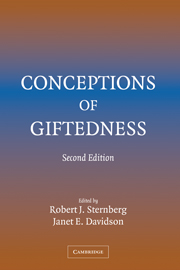Book contents
- Frontmatter
- Contents
- Preface
- List of Contributors
- 1 Gifted Education Without Gifted Children: The Case for No Conception of Giftedness
- 2 Youths Who Reason Exceptionally Well Mathematically and/or Verbally: Using the MVT:D4 Model to Develop Their Talents
- 3 A Child-Responsive Model of Giftedness
- 4 School-Based Conception of Giftedness
- 5 Giftedness, Talent, Expertise, and Creative Achievement
- 6 Permission to Be Gifted: How Conceptions of Giftedness Can Change Lives
- 7 From Gifts to Talents: The DMGT as a Developmental Model
- 8 Nurturing Talent in Gifted Students of Color
- 9 The Munich Model of Giftedness Designed to Identify and Promote Gifted Students
- 10 Systemic Approaches to Giftedness: Contributions of Russian Psychology
- 11 Giftedness and Gifted Education
- 12 The Importance of Contexts in Theories of Giftedness: Learning to Embrace the Messy Joys of Subjectivity
- 13 Feminist Perspectives on Talent Development: A Research-Based Conception of Giftedness in Women
- 14 The Three-Ring Conception of Giftedness: A Developmental Model for Promoting Creative Productivity
- 15 In Defense of a Psychometric Approach to the Definition of Academic Giftedness: A Conservative View from a Die-Hard Liberal
- 16 Creative Giftedness
- 17 Genetics of Giftedness: The Implications of an Emergenic–Epigenetic Model
- 18 The WICS Model of Giftedness
- 19 Beyond Expertise: Conceptions of Giftedness as Great Performance
- 20 Domain-Specific Giftedness: Applications in School and Life
- 21 Extreme Giftedness
- 22 Making Giftedness Productive
- 23 The Actiotope Model of Giftedness
- 24 The Scientific Study of Giftedness
- Author Index
- Subject Index
11 - Giftedness and Gifted Education
- Frontmatter
- Contents
- Preface
- List of Contributors
- 1 Gifted Education Without Gifted Children: The Case for No Conception of Giftedness
- 2 Youths Who Reason Exceptionally Well Mathematically and/or Verbally: Using the MVT:D4 Model to Develop Their Talents
- 3 A Child-Responsive Model of Giftedness
- 4 School-Based Conception of Giftedness
- 5 Giftedness, Talent, Expertise, and Creative Achievement
- 6 Permission to Be Gifted: How Conceptions of Giftedness Can Change Lives
- 7 From Gifts to Talents: The DMGT as a Developmental Model
- 8 Nurturing Talent in Gifted Students of Color
- 9 The Munich Model of Giftedness Designed to Identify and Promote Gifted Students
- 10 Systemic Approaches to Giftedness: Contributions of Russian Psychology
- 11 Giftedness and Gifted Education
- 12 The Importance of Contexts in Theories of Giftedness: Learning to Embrace the Messy Joys of Subjectivity
- 13 Feminist Perspectives on Talent Development: A Research-Based Conception of Giftedness in Women
- 14 The Three-Ring Conception of Giftedness: A Developmental Model for Promoting Creative Productivity
- 15 In Defense of a Psychometric Approach to the Definition of Academic Giftedness: A Conservative View from a Die-Hard Liberal
- 16 Creative Giftedness
- 17 Genetics of Giftedness: The Implications of an Emergenic–Epigenetic Model
- 18 The WICS Model of Giftedness
- 19 Beyond Expertise: Conceptions of Giftedness as Great Performance
- 20 Domain-Specific Giftedness: Applications in School and Life
- 21 Extreme Giftedness
- 22 Making Giftedness Productive
- 23 The Actiotope Model of Giftedness
- 24 The Scientific Study of Giftedness
- Author Index
- Subject Index
Summary
WHAT IS GIFTEDNESS?
Most disciplines of psychology have had difficulties with defining their technical terms, and the situation is no different with the term “giftedness.” A definition should give a formal and concise description of the meaning of a concept or construct. Unfortunately, the scientific language of psychology is full of words inherited from everyday language and terms such as giftedness are not only linked to synonyms like “high ability,” “aptitude,” or “talent” but each term can assume different meanings. These meanings carry a long history of cultural use, “folk” wisdom, and/or misconception. Furthermore, a concise definition is almost impossible because the context within which the definition is made may refer to a process, key elements of giftedness, provisions for the gifted, or education of the gifted. In addition, it is not easy completely to separate theoretical and practical concepts because adherence to a theory of giftedness determines one's research and educational approaches.
If all this was not bad enough, the meanings are tainted by an emotionalism that seems to engulf the concept of giftedness. For example, in German the word for giftedness can be begabung or hochbegabung. The connotation with hochbegabung can be value laden, associating giftedness with elitism. A similar situation exists in French (doués or surdoués) and in Spanish (dotado or superdotado). Such a connotation evokes emotional reactions and negative feelings that have hampered worldwide progress in educating the gifted (Williams & Mitchel, 1989).
- Type
- Chapter
- Information
- Conceptions of Giftedness , pp. 187 - 200Publisher: Cambridge University PressPrint publication year: 2005
- 46
- Cited by

